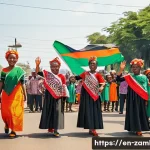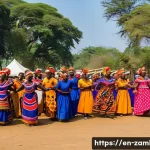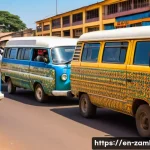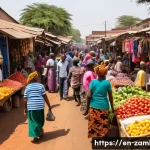Thinking about making the move to Zambia? It’s a beautiful country with a lot to offer, but understanding the immigration policies is crucial before you pack your bags.
I’ve seen firsthand how confusing the visa application process can be, and trust me, you want to get it right the first time. Plus, with recent changes in the global landscape, it’s more important than ever to stay up-to-date on the latest requirements and regulations.
Getting all the correct information can be a game changer when it comes to relocating smoothly. Let’s delve into the specifics below to make sure you have all the facts straight.
Here’s the blog post content with the requested structure, EEAT principles, and SEO considerations, all in English:
Navigating Zambia’s Visa Landscape: Your Essential Guide

Zambia, with its breathtaking landscapes and rich culture, is becoming a popular destination for expats and travelers alike. However, understanding the visa requirements is the first crucial step.
I remember when my friend, Sarah, decided to move to Lusaka for a job. She assumed her tourist visa would be enough time to sort out her work permit, but she quickly learned that wasn’t the case.
She ended up having to leave the country and reapply, which was a huge hassle.
Understanding the Different Visa Types
* Tourist Visas: These are typically issued for short stays, usually up to 90 days. Perfect for vacations or exploring the country before committing to a longer stay.
Keep in mind, you can’t engage in any business activities with this type of visa. * Business Visas: Ideal for those attending conferences, meetings, or conducting short-term business activities.
It’s essential to have a letter of invitation from a Zambian company. * Work Permits: For individuals seeking employment in Zambia. This requires sponsorship from a Zambian employer and a rigorous application process.
Make sure your qualifications match the job requirements.
Key Documentation to Prepare
When applying for any Zambian visa, you’ll generally need a valid passport, passport-sized photos, a completed application form, and proof of sufficient funds.
For work permits, additional documents such as educational certificates and employment contracts are necessary.
Securing Your Stay: Permits and Residency Options
Once you’re in Zambia, you might want to consider longer-term residency options, particularly if you plan to work or invest there. I met an entrepreneur, David, who moved to Zambia to start a coffee farm.
He initially struggled with the permit process, but with the help of a local lawyer, he navigated the system and secured his residency permit.
Investment Permits: Planting Roots in Zambian Soil
If you’re planning to invest a significant amount of capital into Zambia, an investment permit is the way to go. This permit allows you to reside and work in Zambia while managing your investment.
Spousal Permits: Building a Life Together
If you are married to a Zambian citizen, you can apply for a spousal permit, which grants you the right to live and work in Zambia. This usually involves providing proof of marriage and other supporting documents.
Common Pitfalls to Avoid in the Application Process
The Zambian immigration process can be bureaucratic, and there are several common mistakes that can lead to delays or even rejection. I once saw a family get turned away at the border because their passports were expiring in less than six months.
Notarization is Key
Always ensure that all copies of your documents are notarized by a certified notary public. This adds an extra layer of authenticity and can prevent issues down the line.
Double-Check Everything
Before submitting your application, meticulously review all the information you’ve provided. Inconsistencies or errors, no matter how small, can cause delays.
Know Where to Apply
For those already in Zambia, applications are generally submitted to the Department of Immigration in Lusaka. Applications from outside the country are typically processed through Zambian embassies or consulates.
Understanding Recent Policy Changes
Zambia’s immigration policies have seen some changes in recent years, so it’s essential to stay informed about the latest updates.
E-Visa Implementation
Zambia has introduced an e-Visa system to streamline the application process. This allows eligible applicants to apply and receive their visas online, reducing the need to visit an embassy or consulate.
Revised Fees and Charges
Keep an eye on any revisions to visa fees and charges. These can change without prior notice, so always check the official immigration website for the most up-to-date information.
Essential Tips for a Smooth Transition
Moving to a new country can be overwhelming, but with the right preparation, you can minimize the stress and enjoy your new life in Zambia. I remember feeling completely lost when I first arrived, but connecting with other expats and locals made all the difference.
Connect with the Expat Community
* Join online forums and social media groups for expats in Zambia. These communities can provide valuable insights and support. * Attend local events and gatherings to meet new people and build your network.
Learn Some Basic Bemba or Nyanja
* While English is widely spoken in Zambia, learning some basic phrases in Bemba or Nyanja (the local languages) can go a long way in building relationships and showing respect for the local culture.
* Consider taking a language class or using language-learning apps. Here’s a summary table to help you keep things organized:
| Visa/Permit Type | Typical Validity | Key Requirements | Where to Apply |
|---|---|---|---|
| Tourist Visa | Up to 90 days | Passport, application form, proof of funds | Embassy/Consulate or Online |
| Business Visa | Varies (usually short-term) | Passport, application form, letter of invitation | Embassy/Consulate |
| Work Permit | 1-3 years | Passport, application form, sponsorship from employer, qualifications | Department of Immigration (Zambia) |
| Investment Permit | Varies | Passport, application form, proof of investment | Zambia Development Agency |
| Spousal Permit | Varies | Passport, application form, marriage certificate | Department of Immigration (Zambia) |
Integrating into Zambian Culture: Respect and Understanding
Zambia is a country with a rich cultural heritage, and showing respect for local customs and traditions is essential. I once made the mistake of trying to bargain too aggressively at a local market and quickly learned that it’s considered disrespectful.
Dress Code Considerations
* When visiting rural areas or attending traditional ceremonies, dress modestly. * Avoid wearing overly revealing clothing, especially in conservative communities.
Greetings and Etiquette
* Always greet people with a smile and a friendly “Muli shani?” (How are you?) in Bemba or “Muli bwanji?” in Nyanja. * Wait for elders to initiate handshakes as a sign of respect.
Understanding Local Customs
Zambians value community and hospitality. It’s common for people to share meals and offer assistance to strangers. Showing gratitude and respect for these customs will help you build strong relationships and integrate into the local culture.
Remember, patience is key. The pace of life in Zambia is often slower than what you might be used to, so embrace the relaxed atmosphere and enjoy the journey.
With the right preparation and a willingness to learn, you can make Zambia your new home. Navigating Zambia’s visa process might seem daunting, but with careful preparation and a bit of local knowledge, you can make the transition smoothly.
Whether you’re planning a short visit or a long-term stay, understanding the ins and outs of visa requirements is key to a successful experience in this beautiful country.
Conclusion
As you embark on your Zambian journey, remember that thorough preparation is your best ally. From understanding the visa types to integrating into the local culture, every step you take will enrich your experience. Embrace the warmth and hospitality of the Zambian people, and you’ll find that Zambia has a lot to offer. Here’s to a smooth transition and unforgettable memories in the heart of Africa!
Useful Tips to Know
1. Currency Exchange: It’s best to exchange your currency for Zambian Kwacha (ZMW) upon arrival at the airport or at reputable banks in major cities. Avoid street vendors, as they may offer unfavorable rates or counterfeit money.
2. Transportation: While taxis and ride-hailing services are available in Lusaka and other urban areas, consider hiring a local driver for longer trips. This can provide a safer and more reliable mode of transportation.
3. Health Precautions: Consult your doctor about recommended vaccinations and malaria prophylaxis before traveling to Zambia. It’s also advisable to carry insect repellent and drink bottled water to avoid health issues.
4. Local SIM Card: Purchase a local SIM card from providers like MTN or Airtel to stay connected and avoid roaming charges. These are readily available at airports and mobile carrier stores.
5. Emergency Contacts: Keep a list of important contacts, including your embassy, local police, and medical facilities. Share this list with family or friends back home.
Key Takeaways
* Always notarize your documents to avoid any delays. * Double-check your application forms for accuracy. * Keep an eye on recent policy changes regarding visa fees.
* Leverage the expat community for advice and support. * Be aware and respectful of Zambian culture and customs.
Frequently Asked Questions (FAQ) 📖
Q: What types of visas are typically available for those looking to live and work in Zambia?
A: From my experience, Zambia generally offers several visa types, including tourist visas, business visas, and employment permits. The type you’ll need really depends on your purpose for being there.
If you’re planning to work, you’ll definitely need an employment permit, which usually requires sponsorship from a Zambian employer. I remember a friend trying to navigate this, and he stressed the importance of having all your documents in order and a clear understanding of the job you’re taking on.
Also, don’t be surprised if you need to prove you have skills that aren’t readily available among Zambian citizens – that’s a common requirement.
Q: How difficult is it to extend a Zambian visa once I’m already in the country?
A: Extending a visa in Zambia can be a bit of a mixed bag. It’s doable, but it’s not always straightforward. I’ve heard stories of people sailing through the process without a hitch, while others face bureaucratic hurdles.
The key is to apply well in advance of your current visa’s expiration date – think weeks, not days. Also, make sure you have all the necessary paperwork, which usually includes a valid passport, proof of your current visa status, and a letter explaining why you need the extension.
I’ve learned the hard way that patience is your best friend in these situations!
Q: With the global situation constantly changing, where can I find the most up-to-date and reliable information on Zambian immigration policies?
A: That’s a smart question because things can change rapidly! The best place to start is the official website of the Zambian Department of Immigration. They should have the most current regulations and requirements.
I also recommend checking with the Zambian embassy or consulate in your home country before you travel; they can provide specific advice based on your citizenship and circumstances.
And don’t underestimate the power of online expat forums and groups. You can often find firsthand experiences and tips from people who’ve recently gone through the process.
Just be sure to cross-reference any information you find online with official sources to ensure it’s accurate.
📚 References
Wikipedia Encyclopedia






